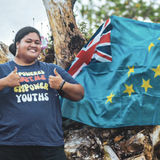Rising sea levels and extreme weather events are putting Tuvalu on the front line of climate change. The island could be completely underwater by 2050, making its inhabitants the world’s first officially recognised climate refugees. For environmental organisations and climate scientists, this portrayal highlights the urgency of the climate crisis and raises awareness of the need for action. But how do Tuvaluans see themselves? Lilly Teafa is from the large ocean state of Tuvalu and an advocate for climate justice. She represents her country at international conferences, such as at the COP28 and at the International Court of Justice and organizes environmental protection programmes for young people from Tuvalu.
What climate change impacts are people in Tuvalu experiencing?
Tuvalu is a country in the South Pacific, we are known as the fourth smallest country in the world with a population of 12,000 people. Our country has beautiful sandy beaches, beautiful seas and a beautiful culture. But climate change is playing a vital role in our lives. We have lost so much to this climate crisis: we are losing our land, we are losing our livelihoods, and we are losing our lives. It is already difficult to live in Tuvalu because of rising sea levels, water intrusion, droughts and high temperatures. Tuvalu normally has a wet season and a dry season. Growing up in Tuvalu, you know when the season is coming, what is going to happen and that you have to be prepared. It is part of our culture and how we also preserve our food. But because of the climate crisis, weather patterns are not what they were before. We can have a drought in the middle of the wet season and rising sea levels in the middle of the dry season. This is happening in all the eight islands of our country, and we can’t control it. These are physical impacts but there are also emotional impacts where we are losing our people. People are moving away, and people are also dying.
How have these climate change impacts changed your relationship with the environment?
As Tuvaluans we are told that we are one with the environment, with Mother Nature, and that it is our duty to take care of her. If you take care of nature, nature will take care of you. We are especially dependent on the sea, the Moana, for fish and meat. We depend on everything that grows on the land, and we depend on everything that lives in the air because we breathe it. So these are the natural elements that we have grown up with and take care of. It is our responsibility not to take too much from the sea, the land and the air. We have been doing this for so many centuries, but the outside world is sharing a different mindset, and that mindset is affecting us. Even though we have been the guardians of the sea and the land for a long time, Mother Nature is coming for us. Not just us, the world. But it is sad that we are the first to experience the impacts.
People from Tuvalu are officially recognised as the world’s first climate refugees. What do you think about this?
I don’t think of our people as climate refugees, and I don’t want our people to be called that. Why is there even a word like that? I think climate refugee is just a word to hide the intention of bigger countries to say, ‘we don’t care’ and also to categorize us as poor people. I think people are migrating because they want a better life. But they will also long to come back. Where will they come back to if there is no land because of the climate crisis? If that’s the reality, we don’t want to go there, and that’s why we are fighting.
And when people do migrate, what are the reasons?
Tuvalu is in transition to become a Westernised community. This transition is not good for us because we are people who depend on the natural elements. But now, because of the climate crisis, we are more dependent on western societies, especially on imported food. Because of that we have unhealthy eating patterns and lifestyles and a high level of people with NCDs (non-communicable diseases), which is also the number one death in Tuvalu. We are no longer the healthy and strong Tuvaluans that we were. Resources are limited and that is why our people are moving away. There is nothing to grow, nothing to farm, nothing to fish. People are migrating because they want a better life, because they need to survive. But the thing about being a Tuvaluan is that no matter where you go, you can never take Tuvalu out of your heart. It will be there in your soul forever, until the day you die. Even though there are people migrating, there are also people staying. These people want to maintain our land and the resources that we have so that the people who migrate will have somewhere to go home to.
What kind of climate actions are people in Tuvalu taking to fight the climate crisis?
We have been fighting ever since the start of the climate crisis, but we are very grateful to our neighbours like Australia and New Zealand and organisations with financial support like the World Bank and the Asian Development Bank (ADB) and other organisations who see the need for Tuvaluans to survive. I also commend the efforts of our government, the past and the present. We have land reclamation projects where we are reclaiming and elevating the land to make sure that the high seas don’t eat up our land. I also feel sorry for our resources. We are taking sand from the ocean, from the Moana, but we have no choice because we can’t breathe under the sea. There are also health programmes that are sponsored by the World Bank and the Asian Development Bank that are trying to revive the Tuvaluan way of living, especially our eating patterns. There is so much going on, even the youth are running their own projects like tree planting, coral restoration and reviving our culture. Now with the climate crisis everyone is trying to survive, but the way that we are surviving is western and we are forgetting our own ways. So it is really important to revive our culture in a traditional way because these have lived with us and saved us. Maybe if we combine western and Tuvaluan ways there will be alternatives for a better future for our country.
What kind of support could other countries give Tuvalu for them to keep fighting climate change?
Well, this is a very timely question because I am at the ICJ hearing for an advisory opinion. It shouldn’t be this way, but these are the alternatives that Tuvalu has turned to. We have asked our neighbours in the Pacific to support us, especially our bothers Vanuatu, the Solomons, the Melanesians, the Micronesians and the Polynesians. In our family, we have worked together and have called for help. We have been joined by indigenous communities all around the world. Being here in The Hague, I hope that the advisory opinion will push countries to take action now to stop heating the earth. Their heating of the earth is hurting us. We have survived so much because of Mother Nature. But because of the greed that mankind has, we, and especially Tuvaluans, are facing the effects of Mother Nature’s anger. We want and need countries to take care of the environment and make sure that they meet their obligations so that the rest of the world can survive.
How does climate change affect global migration patterns? During the programme ‘Unpacking Climate Migration’ on Thursday 16 January, we will delve into the realities of climate migration. Register here for free!






